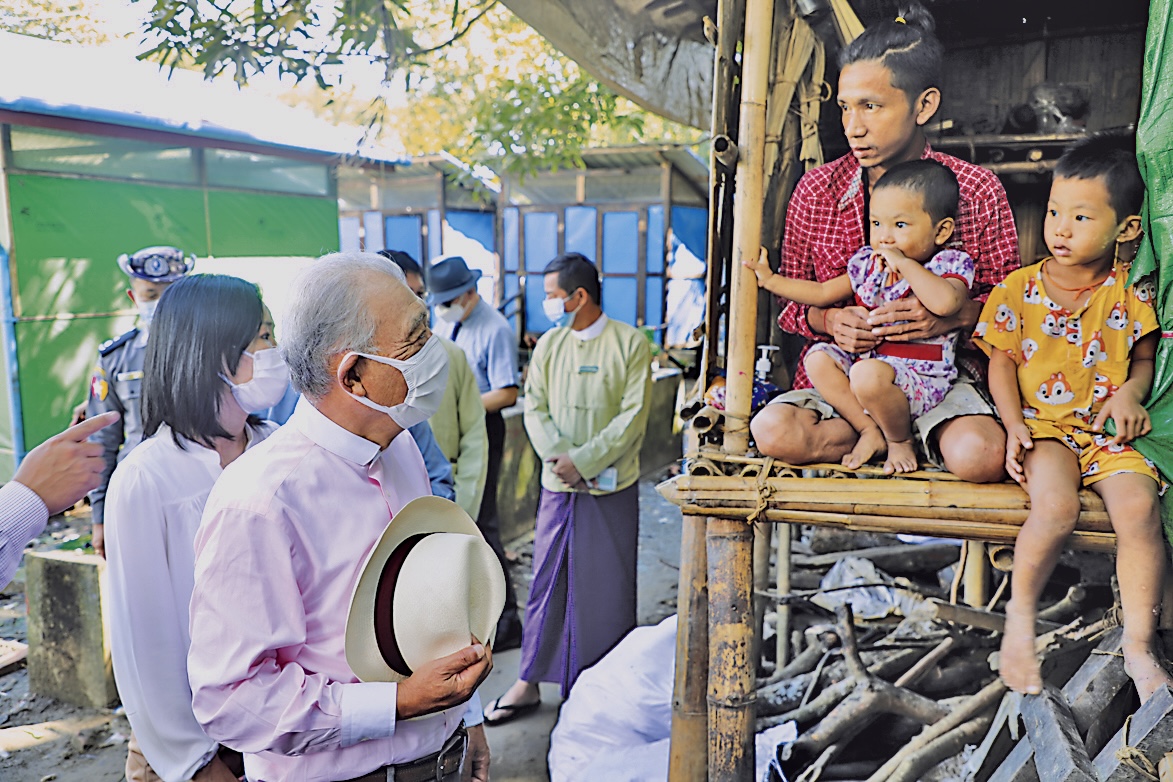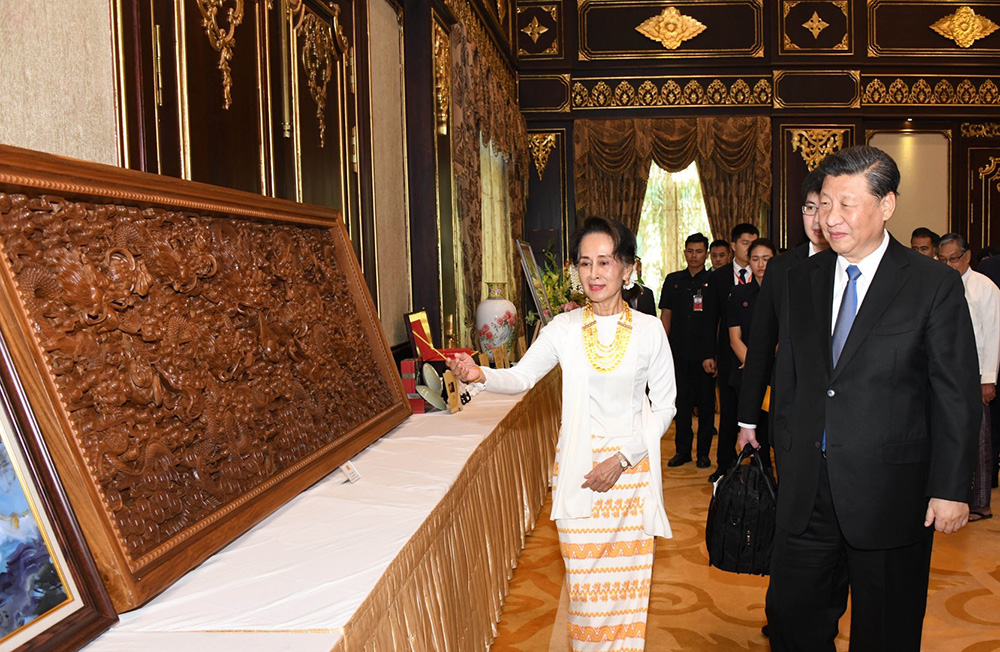It is a busy week for coup leader Senior General Min Aung Hlaing, with high ranking officials from China, Japan and Thailand flying into the Myanmar capital Naypyitaw for meetings.
Sun Guoxiang, the Special Envoy of Asian Affairs of the Ministry of Foreign Affairs of China, arrived in Naypyitaw to meet Snr. Gen. Min Aung Hlaing over the weekend. It is his second official visit since the junta’s February 1 coup.
But in contrast to the coup leader’s recent meeting with former US politician Bill Richardson – his second meeting with him in two weeks – which took place in the refined surroundings of the diplomatic hall in Naypyitaw and led to the release of the American journalist Danny Fenster, the junta’s mouthpiece The New Light of Myanmar showed Sun Guoxiang meeting Snr. Gen. Min Aung Hlaing in a more modest room.
And unlike Sun Guoxiang’s unpublicized week-long visit in late August, the regime has announced Sun’s visit this time. Only at the end of the August trip did Beijing’s foreign ministry spokesperson announce that Sun Guoxiang had been in the country, while also calling for the return to a democratic transition in Myanmar.
Foreign Ministry spokesperson Wang Wenbin said during a press conference then that the special envoy “exchanged views with [regime officials] on the political landscape in Myanmar and China-Myanmar cooperation in combating COVID-19”.

The most interesting message from China regarding the August visit came later in Wang’s statement when he stressed, “We will work together with the international community to play a constructive role in Myanmar’s efforts to restore social stability and resume democratic transformation at an early date”. From that, it appears that China’s stance toward Myanmar remains unchanged.
This visit, Sun Guoxiang will press to meet detained State Counselor Daw Aung San Suu Kyi but if that request is denied, he will likely ask to meet former president U Htin Kyaw, a close associate of Suu Kyi. The regime may allow him to meet U Htin Kyaw but Suu Kyi will make the final call.
The message from China is clear: Beijing won’t give up on Daw Aung San Suu Kyi.
Beijing still wants to see Myanmar return to the pre-coup period when the now-ousted National League for Democracy (NLD) government and the Myanmar military co-existed and the country was relatively stable.
During his last visit in August, Sun Guoxiang was surprised by the degree of hostility displayed by the coup leader towards the NLD, which many believe is facing possible dissolution. Moreover, the Chinese officials were taken aback by the junta’s hatred for Daw Aung San Suu Kyi.
However, Beijing still hopes that there is a room to negotiate in Myanmar and they are not giving up on Suu Kyi. China has kept up its communications with the NLD, and NLD representatives were invited to take part in virtual conferences on political parties in the Asia region hosted by China’s ruling Communist Party (CCP).
Sun Guoxiang’s latest visit will also focus on border security, the development of ethnic armed organizations along the China-Myanmar border and China-Myanmar cooperation in combating COVID-19.

China is satisfied to see the implementation of a COVID-19 vaccination program in Myanmar, but is concerned about growing instability and frequent armed clashes close to the Sino-Myanmar frontier in northern Myanmar.
There has been fighting between the Myanmar National Democratic Alliance Army (MNDAA) and the Myanmar military near the town of Mong Koe on the Myanmar-China border. The MNDAA is known to be a proxy of China but the recent clashes may have increased uneasiness in Beijing.
A few weeks ago, China pressured the MNDAA to stop fighting but clashes continued. China is worried about the renewed spread of COVID 19 along its border. Beijing is also hosting the Winter Olympics in February and doesn’t want to see an influx of refugees or rising tensions on its southwestern border.
It is curious to learn more about how the younger generation of policy makers in China’s central government view and interpret the evolving political situation in Myanmar. For instance, there are rumors that Beijing wanted to invite the coup leader to attend the upcoming China-ASEAN Summit in China, which President Xi Jinping will attend. But it is believed that some elements in the government and the CCP were uncomfortable with the idea of Snr. Gen. Min Aung Hlaing attending.
The Association of Southeast Asian Nations (ASEAN) made the decision to exclude the coup leader from last month’s ASEAN summit, and some countries in the regional bloc remain adamant that he should continue to be excluded from future meetings. It is possible that Beijing will invite the junta foreign minister Wunna Maung Lwin in the coup leader’s place.
Vice Senior General Soe Win, deputy leader of the regime’s governing State Administration Council (SAC) and deputy commander of the Myanmar military, is also on the short list to attend the summit. Vice Sen. Gen. Soe Win has issued several orders to annihilate pro-democracy demonstrators and the civilian resistance fighters of the People’s Defense Forces.
Japan’s special envoy to Myanmar Yohei Sasakawa also arrived in Naypyitaw over the weekend and met the coup leader.
Known to be the godfather of the regime leader, Yohei Sasakawa has enjoyed a long friendship with senior military commanders and successfully mediated a ceasefire between the Myanmar military and the ethnic Rakhine armed group the Arakan Army before last year’s general election.
After meeting Snr. Gen. Min Aung Hlaing, Yohei Sasakawa travelled to Rakhine State where he met with representatives of ethnic political parties. China is said to be concerned about Japan’s motives and economic interests in Myanmar.
Japan’s Foreign Minister Yoshimasa Hayashi said that Sasakawa’s visit “was not carried out in his capacity as the government representative”, so he is in Myanmar in a private capacity.
Yohei Sasakawa, Bill Richardson and the coup leader all share one thing in common: a dislike of Daw Aung San Suu Kyi. So why are they are all in Myanmar around the same time?
Washington has taken steps since the coup to prevent the regime leaders from accessing government funds held in the United States, as well as imposing other sanctions on them. The junta doesn’t want any further international sanctions and arms embargoes on the regime and the cronies who supported the coup and are involved in arms procurement and illicit trade.
As Sun Guoxiang is Beijing’s official special envoy, he has more leverage with both the regime and the NLD (although China will say that its influence is limited). The message from Beijing is that China is not giving up on Daw Aung San Suu Kyi. The junta will ponder whether to allow Sun Guoxiang to meet Suu Kyi during this visit. If not, perhaps that will happen on his next visit, when the ousted State Counselor is likely have been sentenced on a number of criminal charges.
You may also like these stories:
ASEAN Acknowledges Illegality of Myanmar’s Military Coup
China Withholds Full Legitimacy From Myanmar Junta: Old Wine in a New Bottle?
China’s Embrace of the Taliban Has a Painful Resonance in Myanmar

















